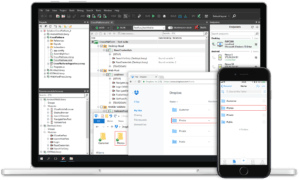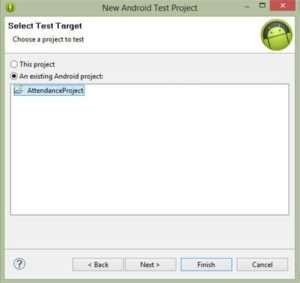Here is the list of some top Android application testing tools:
- Robotium
- Experitest SeeTest Continuous Testing Platform
- MonkeyRunner
- Ranorex
- Appium
- UI Automator
1. Robotium Android Testing Tool
Robotium is one the first and frequently utilized automated testing tools for software supported on Android.
Robotium is a free Android UI testing tool. It is suitable for tests automation for different Android versions and sub-versions. Software developers often describe it as Selenium for Android. Tests created by Robotium are written in Java. In fact, Robotium is a library for unit tests.
Robotium is the android test automation framework for testing native and hybrid android applications. It provides simple API to write UI automation scripts.However, Number of tools are available for testing Android applications, Robotium is the most commonly used Android testing tool.
Robotium can be used to write functional, system and user acceptance test cases. Robotium Test cases can be executed in Android emulator as well as the Android real device.
2. ExperiTest SeeTest Continuous Testing Platform
One of the main challenges of testing Android apps is dealing with fragmentation – the huge amount of Android devices, versions and custom versions currently in use.
SeeTest Continuous Testing platform helps you execute your tests on a large number of remote android devices and simulators located in a Digital Assurance Lab.
Large-scale parallel execution on numerous devices provides fast feedback that ensures a great experience for all your users.
- Run tests created in any framework – such as Appium and Espresso and any language
- Develop robust tests with visual tools such as device reflection, object spy, test recorder and more.
- Cover every use case and application type – native web or hybrid, system apps, 3rd party applications, or apps developed with SDKs
- Tests integration with device components and integration with systems apps such as camera, audio, GPS, Google now, Google Assistant or Google Maps (Test functionality such as barcode & check scanning, voice authentication location-based offers or fingerprint authentication)
- Run performance testing to ensure your application behaves as it should under any device condition, and monitor its effect on device vitals
- Perform debugging on remote devices with Android studio, as though the device was locally connected. You can even debug on the exact device where the error occurred.
- Integrate to any CI environment to trigger test execution automatically for a 24/7 hands-free continuous testing.
Leverage auto-generate, detailed reports containing step by step data, screenshots and log reports to drive rapid resolution and actionable analytics to support quality decisions
Link: experitest SeeTest Continuous Testing Platform
3. MonkeyRunner Android App Testing
The monkeyrunner tool provides an API for writing programs that control an Android device or emulator from outside of Android code. With monkeyrunner, you can write a Python program that installs an Android application or test package, runs it, sends keystrokes to it, takes screenshots of its user interface, and stores screenshots on the workstation. The monkeyrunner tool is primarily designed to test applications and devices at the functional/framework level and for running unit test suites, but you are free to use it for other purposes.
The monkeyrunner tool is not related to the UI/Application Exerciser Monkey, also known as the monkey tool. The monkey tool runs in an adb shell directly on the device or emulator and generates pseudo-random streams of user and system events. In comparison, the monkeyrunner tool controls devices and emulators from a workstation by sending specific commands and events from an API.
MonkeyRunner can run tests on real devices connected to a PC or emulators. The tool has an API what allows it to control a smartphone, a tablet or an emulator from outside of Android code.
A significant disadvantage of the mobile app testing tool is that it is necessary to write scripts for each device. Another problem of MonkeyRunner is that the tests require adjustments each time when the user interface of the tested program is changed.
4. Ranorex Android Application Testing Tool
Ranorex is a good tool for tests automation not only for the latest but also for early versions and sub-versions of Android, beginning from Android 2.2.
One of the Ranorex advantages is its detailed reports with screenshots. It can connect a smartphone or a tablet to the Internet via WiFi.
Ranorex Studio empowers testers with a complete toolset for end-to-end testing of desktop, web and mobile applications in a single license. Automate tests on a Windows desktop, and then execute them locally or remotely, on real iOS or Android mobile devices or on simulators/emulators. Run tests in parallel and accelerate cross-browser testing for Chrome, Firefox, Safari, Microsoft Edge, and more. With Ranorex Studio, you and your team will spend less time resolving issues with unstable tests and more time assessing the quality of your application.
It is a commercial mobile application tool; its license price is 1990 EUR. Ranorex searches elements rather slowly; it takes up to 30 seconds to perform such an operation. One must instrument APK files for Ranorex. Otherwise, it is impossible to automate tests by means of this tool, as it works only with instrumented APK files.

5. Appium Android Automation Framework
It’s a framework for creating automated tests for iOS and Android. It is a free tool. It supports Android versions from 2.3 and later. Appium utilizes WebDriver interface for tests running. It supports many programming languages, such as Java, C#, Ruby and other which are in the WebDriver library.
Appium is an open-source tool for automating native, mobile web, and hybrid applications on iOS mobile, Android mobile, and Windows desktop platforms. Native apps are those written using the iOS, Android, or Windows SDKs. Mobile web apps are web apps accessed using a mobile browser (Appium supports Safari on iOS and Chrome or the built-in ‘Browser’ app on Android). Hybrid apps have a wrapper around a “webview” — a native control that enables interaction with web content. Projects like Apache Cordova or Phonegap make it easy to build apps using web technologies that are then bundled into a native wrapper, creating a hybrid app.
It can control Safari and Chrome on mobile devices. This allows testing mobile websites using Appium and these browsers.
But some automated test engineers complain that it provides poor, insufficient reports. Also its weakness is reduced XPath support on mobile devices.

6. UI Automator for Android Test Automation
This tool has been recently elaborated by Google. It supports Android versions beginning from 4.1. One should select another Android app testing tool in order to automate tests for earlier versions. UI Automator is able to interact with all kinds of software products for Android, including system applications. This enables UI Automator to lock and unlock a smartphone or a tablet.
Testing your app is an integral part of the app development process. By running tests against your app consistently, you can verify your app’s correctness, functional behavior, and usability before you release it publicly.
Testing also provides you with the following advantages:
- Rapid feedback on failures.
- Early failure detection in the development cycle.
- Safer code refactoring, letting you optimize code without worrying about regressions.
- Stable development velocity, helping you minimize technical debt.
Scripts created by means of this tool can be executed on many different Android platforms. It allows reproducing complex sequences of user actions.
UI Automator also can utilize external buttons of a device, such as buttons for going back, volume regulation, turning on and off the device.
It can be integrated with testing framework TestNG. In this case, UI Automator can generate informative and detailed reports, similar to reports generated by Ranorex. This tool also searches elements very fast.
Software testing experts find UI Automator good for quality mobile application testing on many Android platforms. It is one of the best tools for Android applications, as it is elaborated by Google especially for this operating system.
Usually, about 80% of new software bugs reproduce on all the supported platforms. So, one may perform mobile testing on one of the widely used platforms and discover up to 80% of defects. The rest 20% will be found on all the other platforms. That means that in most cases it is better to test software product thoroughly on fewer platforms than hastily on numerous.
At present Android 4.1 is installed on about 66% of all devices using the Android operating system. That is why many automated test engineers often decide that UI Automator is the most suitable solution.
Conclusion
Tests automation is a complex task. It requires thorough preparation and researchers. One should also keep up with all the novelties in information technology, applications, and test automation tools. All this knowledge is necessary for creating the most effective tests.
